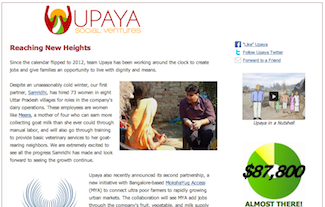This article was originally published 24 December 2012 on indiaspora.org.
Recently, both Bill Gates and the leadership at eBay founder Pierre Omidyar’s foundation have come out and made strong calls for philanthropists to break the status quo and invest their charity dollars as the kind of risk capital needed by entrepreneurs globally to fund potentially-transformative social business models.
Each points to the catalytic role that philanthropic funding can play in breaking a stifling Catch-22 whereby entrepreneurs need capital to build and test their concepts, but these concepts need to be proven before most serious investors will consider funding them.
Nowhere is this problem more acute than in India. Despite the great need – roughly 400 millionpeople live at or below the extreme poverty line – and proliferation of impact funds wanting to invest in new models, investors claim “the supply of entrepreneurs is very low,” and there is a real dearth of investment-ready social businesses.
As Omidyar Network’s Managing Director Matt Bannick articulated perfectly, “it is as if impact investors are lined up around the proverbial water pump waiting for the flood of deals, while no one is actually priming the pump!”
How can we – a community committed to real change – prime that pump? What can we do to produce a new crop of entrepreneurs that is ready to tackle stubborn social problems through business solutions?
1) Let’s commit a certain amount of philanthropic funding to serve as seed capital for early-stage ideas.
Philanthropic capital is the ultimate risk capital — it can absorb a high amount of uncertainty and help an entrepreneur test what works and what doesn’t. It does not ask for an immediate return, or any return at all. In my personal experience, there is a shortage of “investment-ready” entrepreneurs in India, from the perspective of fund managers requiring market returns, but there is no shortage whatsoever of aspiring entrepreneurs with promising ideas that simply need a runway to test them out. Philanthropic capital, even amounts as low as $5K, can provide this runway and help unlock new business models.
By positioning philanthropic capital as an equity investment instead of a simple grant, we open up the possibility of an upside. If the entrepreneur manages to build a profitable and scalable business, our investment would yield returns that would flow right back to the seed fund and be recycled into future investments. As we build up the wins in our portfolio, we would have less and less of a need in future years to raise donor dollars.
2) Let’s commit to mentoring new, inexperienced entrepreneurs.
Entrepreneurs benefit most from the combination of funding plus hands-on business development support. Often times an entrepreneur will know his or her industry and community well, but may not have other skills such as sophisticated financial modeling or information system development. In addition, entrepreneurs and small-business owners from some of India’s poorest communities will have the best relationships with exactly the populations we wish to serve; they do not, however, have MBAs or the polish that venture capitalists wish to see.
I have consistently seen that 12 to 18 months of guidance and mentorship dramatically sharpens such an entrepreneur’s business acumen and ability to manage a scaling enterprise. Empowering less obvious entrepreneurs allows them to grow their businesses and create jobs for the poorer populations around them.
3) Let’s commit to exchanging best practices and “franchising” the models that work.
The seed funding and mentorship will certainly yield a few promising business models. Given the magnitude of the problem at hand, we need to think creatively about scale and replication. The more we compare notes and openly share our business blueprints, the better our chance of inspiring others to adapt these working models to different customer segments and diverse geographies. Again, in India there is no shortage of aspiring entrepreneurs … the biggest hurdles appear to be angel funding, involved mentorship, and a clear articulation of models that can be replicated by execution-oriented, passionate individuals.
The Indiaspora Forum was an exhilarating and inspiring gathering of Indians from across the world who have made great strides in their respective fields – whether it be in medicine, business, music, technology, the culinary arts, literature, or astrophysics! By simply dedicating some of our talent, time, and financial resources, each one of us can help unlock the productive potential of the hundreds of others waiting in the wings for their opportunity.

































